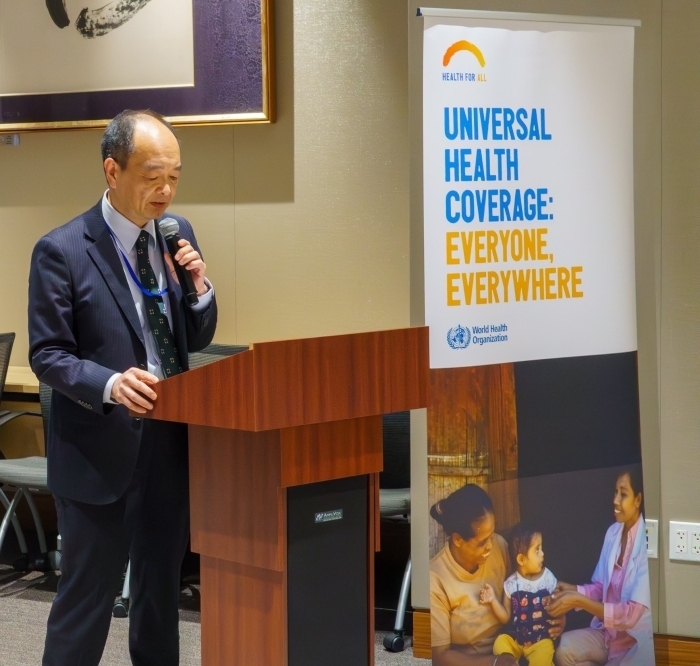Welcome Remarks by H.E. Ambassador YAMANAKA Osamu, Deputy Permanent Representative of Japan to the United Nations, at the Reception celebrating Universal Health Coverage Day, co-sponsored by the Japanese Government and the Group of Friends of UHC and Global Health
2023/12/12

Excellencies, distinguished guests, ladies and gentlemen,
I am deeply honored to stand before you today as the host of this significant reception at the Permanent Mission of Japan, in celebration of Universal Health Coverage Day. On behalf of the Group of Friends of UHC and Global Health, co-chaired by the esteemed Ambassadors of Thailand and Georgia, I extend a warm welcome to each one of you.
As we gather here on December 12th, we mark not only the occasion of Universal Health Coverage Day but also the recent adoption of Resolution A/RES/78/4 on the Political Declaration of the High-Level Meeting on Universal Health Coverage. This year's UN General Assembly, through three pivotal High-Level Meetings on health, underscored the paramount importance of health on the global political agenda.
The High-Level Meeting on Universal Health Coverage reaffirmed the commitment of Heads of States and stakeholders to intensify efforts towards achieving health for all. The consensus emphasized the urgency of establishing robust and resilient health systems that leave no one behind. Strengthening health systems extends beyond the health sector, acknowledging the multifaceted factors influencing health outcomes.
Universal Health Coverage demands tangible actions and strategic investments, particularly in Primary Health Care and the cultivation of a proficient health workforce. The consequences of inaction are stark: 4.5 billion people lack full coverage of essential health services, and 2 billion people face financial hardship due to out-of-pocket health spending.
To realize UHC, new governance and financing models are imperative. Public investments play a pivotal role in building sustainable health systems that can withstand the challenges ahead. It is crucial that we recognize the global impediments created by existing inequities. Bridging these gaps requires international support in the form of capacity building, technical assistance, and debt financing.
Further, Japan has been actively participated in all the relevant discussions on the Future of Global Health Initiatives (FGHI), which is a time-bound multi-stakeholder process of dialogue, research, deliberation, and action, with its purpose to identify ways to ensure GHIs are more effective, efficient, and equitable in complementing domestic financing to strengthen health system capacities and deliver health impacts. On this important day, FGHI has just released the Lusaka Agenda to conclude the process of FGHI, providing the path towards a joint long-term vision of domestically-financed health systems and UHC that leaves no one behind. Japan wholeheartedly welcomes the Agenda, and we are confident that it provides meaningful suggestions for GHIs to accelerate their efforts for better alignment, and ultimately, for ensuring healthy lives and well-being for all at all ages.
Today's program reflects the diverse voices and perspectives essential for accelerating progress towards Universal Health Coverage. We are honored to have distinguished speakers, including the Permanent Representatives of Thailand and Georgia. We are also privileged to receive a message from the WHO Director-General, Dr. Tedros, and interventions from other Representatives, including Ms. Anita Kókai of Hungary on behalf of WASH friends group.
As we engage in dialogue and networking, let us recommit ourselves to the shared goal of achieving Universal Health Coverage. Our collaborative efforts today will contribute to a healthier and more equitable world for all.
Thank you.
